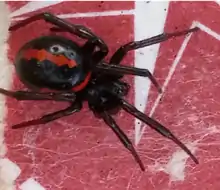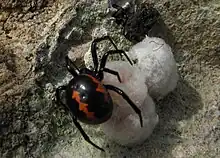| Steatoda paykulliana | |
|---|---|
 | |
| Scientific classification | |
| Domain: | Eukaryota |
| Kingdom: | Animalia |
| Phylum: | Arthropoda |
| Subphylum: | Chelicerata |
| Class: | Arachnida |
| Order: | Araneae |
| Infraorder: | Araneomorphae |
| Family: | Theridiidae |
| Genus: | Steatoda |
| Species: | S. paykulliana |
| Binomial name | |
| Steatoda paykulliana Walckenaer, 1805 | |
| Synonyms | |
| |
Steatoda paykulliana is a species of false black widow spider in the tangle-web spiders family,[1] native to the Mediterranean countries, Southern Europe and Western Asia. The species is named in honor of the Swedish naturalist Gustaf von Paykull (1757–1826).
Description
As is evident from one of the common names associated with Steatoda species, false widow, S. paykulliana resembles black widow spiders in shape and color markings. The female S. paykulliana body length is from 8 mm, to 12 mm when pregnant. The abdomen is globular, colored a shiny black, with two non-overlapping stripes, one dorsal and one lateral. This differentiates it from true black widow spiders that have dorsal and ventral markings. The stripes are ivory-yellow on young females and orange-red on mature ones.[2] The male is only about half the size of the female, with less prominent markings.[3]
S. paykulliana's venom is much less potent than the true black widows', and its effect on humans is minor, similar to a wasp sting.[4]
Behavior

S. paykulliana spins typical tangled three-dimensional webs, usually on sloping ground covered with vegetation. A cocoon is spun around the eggs. In countries of former Yugoslavia, the spiderlings hatch at the end of summer, hibernate in the winter, and reach adulthood at the beginning of the next summer.[2]
Distribution
S. paykulliana is widespread throughout Europe, Asia, and the Middle East. It has been reported in Portugal,[5] Spain,[6] France[7][8] including Corsica,[9] Belgium,[10] Italy,[11] Switzerland,[12] Austria,[13] Slovenia,[14] Croatia,[15] Serbia,[16] Bosnia and Herzegovina,[15] North Macedonia,[17] Albania,[18] Romania,[19] Ukraine,[20] Bulgaria,[21] Greece,[22][23] Malta,[24] Turkey,[25][26][23] Georgia,[23] Lebanon,[27] Syria,[23] Israel,[28][23] Palestine,[23] Azerbaijan,[29][30][23] Dagestan,[31] Russia,[23] Northwest China,[23] Kazakhstan,[23] Southern Kyrgyzstan,[23] Tajikistan,[23] Uzbekistan,[23] Turkmenistan,[23] Iran,[23][32] Saudi Arabia,[23] Yemen,[23] Egypt,[23] Ethiopia,[23] Eritrea,[23] Libya,[23] Tunisia,[23] Algeria,[23] Morocco,[23] the Netherlands [33] and Great Britain.[34][35] Cyprus
References
- ↑ "Oldstyle id: efac57fe71e01e1b2ad87936d53dbd5c". Catalogue of Life. Species 2000: Leiden, the Netherlands.
- 1 2 Bettini, S., ed. (1978). "9". Arthropod Venoms. Berlin/Heidelberg: Springer-Verlag. pp. 213–214. ISBN 978-3-642-45501-8.
- ↑ Zamani, A. (2016). "Predation on Cyrtopodion scabrum (Squamata: Gekkonidae) by Steatoda paykulliana (Araneae: Theridiidae)". Rivista Arachnologica Italiana. 8: 12–15.
- ↑ Maretić, Z.; Levi, H. W.; Levi, L. R. (1964). "The theridiid spider Steatoda paykulliana, poisonous to mammals". Toxicon. 2 (3): 149–154. doi:10.1016/0041-0101(64)90016-9. PMID 14298221.
- ↑ Cardoso, 2000 : Portuguese spiders (Araneae): a preliminary cheklist. Ekologia (Bratislava), vol. 19, sup. 3, p. 19-29 (texte intégral).
- ↑ Blasco-Zumeta, 2000 : Contribution à l'étude de la faune associée a Juniperus thurifera L. dans Los Monegros (Aragon, Espagne). Les Dossiers forestiers, vol. 6, p. 94-103.
- ↑ Canard, 1987 : Données sur la distribution spatio-temporelle des Theridiidae des landes armoricaines. Revue Arachnologique, vol. 5, No. 4, p. 169-183.
- ↑ Thirion, Beau & Guillon, 2007 : Première mention de Steatoda paykulliana (Walckenaer, 1806) (Arachnida : Araneae : Theridiidae) pour les Charentes. Catalogue des Annales de la Société des Sciences Naturelles de la Charente-Maritime, vol. 9, No. 7, p. 743-744.
- ↑ Tiberghien, Canard, Rollard & Ysnel, 1993 : Invertébrés du Parc Régional de Corse. Des richesses à inventorier (seconde partie) les réserves de Scandola, Lavezzi et Cerbicale. Insectes, vol. 91, p. 23-27.
- ↑ Bosmans, 2009 : Een herziene soortenlijst van de Belgische spinnen (Araneae). Nieuwsbrief van de Belgische Arachnologische Vereniging, vol. 24, No. 1/3, p. 33-58 (texte intégral).
- ↑ Trotta, 2005 : Introduzione ai Ragni italiani (Arachnida Araneae). Memorie della Societa Entomologica Italiana, vol. 83, p. 3-178.
- ↑ Blick, Bosmans, Buchar, Gajdoš, Hänggi, Van Helsdingen, Ružicka, Starega & Thaler, 2004 : Checkliste der Spinnen Mitteleuropas. Checklist of the spiders of Central Europe. (Arachnida: Araneae). Version 1. Dezember 2004. (texte intégral).
- ↑ Noflatscher, 1991 : Beiträge zur Spinnenfauna Südtirols - III: Epigäische Spinnen an Xerotherm-Standorten am Mitterberg, bei Neustift und Sterzing (Arachnida: Aranei). Berichte des naturwissenschaftlichen-medizinischen Verein Innsbruck, vol. 78, p. 79-92 (texte intégral).
- ↑ Kostanjšek & Kuntner, 2015 : Araneae Sloveniae: a national spider species checklist. ZooKeys, No. 474, p. 1-91.
- 1 2 Maretic, 1978 :Venoms of Theridiidae, Genus Steatoda. Arthropod Venoms, Springer Science & Business Media, p. 213-216.
- ↑ Grbic & Savic, 2010 : Contribution to the knowledge of the spider fauna (Arachnida, Araneae) on the Fruska Gora Mt. Acta entomologica serbica, vol. 15, No. 1, p. 243-260 (texte intégral).
- ↑ Blagoev, 2002 : Check List of Macedonian Spiders (Araneae). Acta zoologica bulgarica, vol. 54, No. 3, p. 9-34.
- ↑ Deltshev, Vrenosi, Blagoev & Lazarov, 2011 : Spiders of Albania - Faunistic and Zoogeographical Review (Arachnida: Araneae). Acta zoologica bulgarica, vol. 63, No. 2, p. 125-144 (texte intégral).
- ↑ Weiss & Petrisor, 1999 : List of the spiders (Arachnida: Araneae) from Romania. Travaux du Museum National d'Histoire Naturelle "Grigore Antipa", vol. 41, p. 79-107.
- ↑ Polchaninova & Prokopenko, 2013 : Catalogue of the spiders (Arachnida, Aranei) of Left-Bank Ukraine. Artropoda Selecta, suppl. 2, KMK Scientific Press, Moscow, p. 1-268 (texte intégral).
- ↑ Deltshev, Lazarov, Blagoev & Naumova, 2011 : Spiders (Araneae) from the Western Rhodopes Mts (Bulgaria). Biodiversity of Bulgaria 4. Biodiversity of Western Rhodopes (Bulgaria and Greece) II. Pensoft & Musée national d'histoire naturelle de Bulgarie, Sofia, p. 1-43.
- ↑ Bosmans, van Keer, Russell-Smith, A., Kronestedt, Alderweireldt, Bosselaers & de Koninck, 2013 : Spiders of Crete (Araneae). A catalogue of all currently known species from the Greek Island of Crete. Arachnological Contributions. Newsletter of the Belgian arachnological Society, vol. 28, supl. 1, p. 1-147 (texte intégral).
- 1 2 3 4 5 6 7 8 9 10 11 12 13 14 15 16 17 18 19 20 21 22 23 24 Komnenov, Pitta, Zografou & Chatzaki, 2016 : Discovering the still unexplored arachnofauna of the National Park of Dadia-Lefkimi-Soufli, NE Greece: a taxonomic review with description of new species. Zootaxa, No. 4096(1), p. 1-66.
- ↑ Sciberras, Sciberras, Freudenschuss & Pfliegler, 2014 : "Araneus angulatus Clerck,1757 (Araneae: Araneidae), new for the fauna of the Sicilian and Maltese archipelagos". Revista Ibérica de Aracnología, vol. 24, p. 109-110 (texte intégral).
- ↑ Kaya & Ugurtas, 2007 : A Study on Araneo-Fauna (Arachnida: Araneae) of Görükle Campus Area (Bursa). Journal of Biological and Environmental Sciences, vol. 1, No. 2, p. 81-86.
- ↑ Çavusoglu, K., Bayram, A., Maras, M., Kirindi, 2006 : Steatoda paykulliana (Araneae, Theridiidae) (Walckenaer, 1806)’nin Zehir Aygitinin Morfolojisi Hakkinda. Süleyman Demirel Üniversitesi Fen Bilimleri Enstitüsü Dergisi, vol. 10, No. 1, p. 25-29.
- ↑ Assi, 2013 : Nouvelle liste des espèces d'araignées du Liban. Lebanese Science Journal, vol. 14, No. 2, p. 15-24.
- ↑ Pluess, Opatovsky, Gavish-Regev, Lubin & Schmidt, 2008 : Spiders in wheat fields and semi-desert in the Negev (Israel). The Journal of Arachnology, vol. 36, p. 368-373.
- ↑ Topchiyeva, Mehrabova & Hasanov, 2010 : Radiation effect onto biodiversity of spiders. Advances in Biology, Bioengineering and Environment, p. 82-84 (texte intégral).
- ↑ Maruik, Guseinov & Aliev, 2004 : Spiders (Arachnida: Aranei) of Azerbaidjan 4. Fauna of Naxivan. Athropoda Selecta, vol. 13, No. 3, p. 135-149 (texte intégral).
- ↑ Abdurakhmanov & Alieva, 2009 : Composition and Geographical Distribution of the Spiders (Aranei) in the Republic Dagestan. The South of Russia, vol. 3, p. 38-50 (texte intégral).
- ↑ Zamani, 2016 : Predation of Cyrtopodion scabrum (Squamata: Gekkonidae) by Steatoda paykulliana (Araneae: Theridiidae). Arachnida - Rivista Aracnologica Italiana, vol. 8, p. 12-15.
- ↑ new spider species
- ↑ False Widow Spiders
- ↑ Merrett, Russell-Smith & Harvey, 2014 : A Revised Check List of British Spiders. Arachnology, vol. 16, No. 4, p. 134-144.